Collins: "There was no question if I was going to continue playing tennis"
Tennis NewsSunday, 03 May 2020 at 11:00

Despite being only a few years on the WTA Tour, Danielle Collins already reached the 23rd place in the WTA Ranking and semifinal at the Grand Slam.
It all happened in 2019. Collins reached the semifinals at the Australian Open and her career-high in the WTA Ranking, 23rd place. But her tennis story started much earlier. Now, the young American spoke to BehindTheRacquet.com about her whole tennis story.
“It started when I was 15. I was having bad pain in my ribs and issues going to the bathroom. I was extremely sick for a couple of months and saw more than a few doctors. I went to a rheumatologist and I tested positive for autoimmune disease. Everything else looked okay but the doctors told us that it takes some time to accurately diagnose. After a couple of months, they were still finding my bloodwork to be normal. I was having symptoms that were consistent with someone with an autoimmune but they weren’t able to narrow it down.
While in college I would get sick all the time. My college coaches were always pushing me to see doctors and stay on top of it because of the health challenges they saw I was constantly facing. No one could figure it out. I continued to get bloodwork every two months and nothing came of it. During this time I had wrist surgery, a meniscus tear and a lot of joint-related issues. Orthopedics diagnosed me with tendonitis. Unfortunately, I think there were many times many of my symptoms were pushed under the rug because I was an athlete. The doctors saw all the issues I was having and said it was because the years and years of putting my body under physical stress," Collins said.
"When I stepped away from college it seemed like I was getting healthier. I stopped having as many health issues. Then, about two years ago, I started to feel very sore in different areas like my neck, wrists, hands, and even more in my joints. It was right before the Australian Open when I thought this was all just from training hard. When I played a few days in a row the pain would feel different than normal. I spoke to a family doctor and he recommended with everything I have been feeling to go to a rheumatologist and ask to get tested for rheumatoid arthritis. I was fighting back on it because I knew what that was, my grandmother had it and that’s not what I have. I am too young, that can’t be real for someone my age. I pushed it off for a long time.
Periodically I would get bad joint pain, around my menstrual cycle, and it would be debilitating. I would have a hard time getting out of bed and on the worst days would sleep for 15 hours straight. I constantly felt drowsy and tired. The weird thing is I got accustomed to feeling this way. I forgot what it was like to feel healthy and energetic. I forgot what it feels like to wake up without pain in my hands and feet. My body adapted to figure out ways to ignore it. It was 2019 Wimbledon, where I was playing doubles with Bethanie. I was having terrible pain in my hands. I knew something was really wrong. After the loss, I was packing to go home. I couldn’t even fold my clothes with all the pain in my hands. It was the worst pain of my life. I threw everything in my suitcase and went back to Florida, where it began to feel better.
I thought it was strange, that it actually improved, so I decided to get tested for allergies. Maybe I just needed to adjust my diet. My family doctor told me to go to a rheumatologist again, but I didn’t, I thought I knew better. The allergist said to not drink coconut water and was a bit gluten intolerant, which would help with inflammation. Again, after a few weeks, the pain returned. My feet were so inflamed it seemed they changed shapes," said Collins.
"I was playing in August in San Jose and it all became unbearable. It was everywhere. Each part of my body was cracking and popping. This was the last straw and I decided to see the rheumatologist. My appointment was in a few weeks, so I decided to play Toronto in the meantime, which didn’t help. I knew I needed to take care of this before the US Open. After seeing the rheumatologist they found normal bloodwork with erosion in my neck, hands, and feet, which was consistent with RA. It took a lot of bloodwork to rule out other diseases, such as lupus, but they finally diagnosed me with RA after the US Open. That is when I started on medication. The medication only worked to a certain point. I didn’t want to try all these new ones, especially since my quality of life was not improving.
I have been on two different medications since then that have worked very well. I have mixed that with a pretty strict diet. Through all of this, I have learned what I need to do for myself and what prevents a flare-up. I monitor my training and write everything down. I am far more methodical and understand my needs when I am not feeling well. As tennis players, we all get caught up in what everyone else is doing and now I am finding what works for me. I have found peace of mind knowing that everyone is dealing with something in one way or another. I am putting myself in the best situation to be a healthy adult," Collins said.
"There was no question if I was going to continue playing tennis or not. I always answer, ‘F**k yes, I am still playing’. This is what I love to do. Going through this has given me the mental strength to fight through even my worst days on the court. Still having all these goals in mind for me as an athlete helped me deal with all I did. I work diligently a few times a week with a psychologist through it all. I’ve had many people say RA isn’t a real thing and all I need is herbal remedies to help me relax. It was challenging because I felt extremely isolated after my diagnosis. I don’t know any people my age that have it. When I talk to someone they say, ‘I understand, sometimes I get joint pain when I run’. It isn’t the same," said Collins.
"There was just a lot of scrutiny I faced, especially since I was an athlete. You want to believe that you don’t care what others think but in the end you take some things to heart. I didn’t want to be viewed that I was weaker than others just because of it. I didn’t want people calling me sick or let this disease define me. I had to take my situation and find the positives. I have moved forward in many areas the last few months but it still makes me nervous to think I may be a role model for others. I’m not the most outspoken person but I am working on being more comfortable with trying to help others through my experiences,” Collins said.
[embed]https://www.instagram.com/p/B_nUbBVg_cg/[/embed]
claps 0visitors 0
Just In
Popular News
Latest Comments
- My advice to Coco is take a few months off from the tour and focus on the serve. If MacMillan is not producing the expected results, relieve him of his duties and hire someone else. To hell with the rankings and what people will say. Just take a break. Mental health is far more important than money.
- Eventually (as other sports have done) WTA will be forced to make DNA / Gender Testing mandatory in order to protect and promote fairness in competitions. End of so-called 'controversy'.
- It's sad... but Rybakina is not going to be able to endure her groomer's interference in Life and still excel to her best level. BTW: No media has reported her last sentence to the physio. They kept asking questions and she abruptly told them: "I know what it is; I'm ready to go now".
- You seem to have 'lost the plot' ??
- This needs to be done, and I think Jessica Pegula is an excellent choice for chair to look into the situation. However, a very brief look at the other members of the panel would suggest a very USA heavy contingent. The group needs to represent all interests, not just turn it into a way the US can screw more money out of an already biased calendar.
- The tennis world should be kissing her feet for taking-on this long needed position in a much needed council. The WTA and ATP need a good shaking-up. Pegula's business heritage is a proven one. Let's hope she and her colleagues can stop WTA & ATP from shutting their work down and out. GO GET 'EM !!
- So the Sportswasher's largest market is... the Filipino community? That's all well and good but the hundreds and hundreds of empty seats throughout is embarrassing. Talk about bad optics!
- The poor Head Sportswasher has been whining and crying in the media, and basically threatening Saba, Iga, etc. Must be a real Ego Buster when they dangle money and people (especially Women) say, 'No thanks'.
- "Losing-itis" is not uncommon in Emma's small world. Just keeps begging the question, 'What are sponsors paying for? Limited tennis appearances... or Social Selfie Media presence?'
- Dubai can suck it up like everyone else. Just because they think they run the show, they do not. Sportswashing does not give them Power.
Loading








